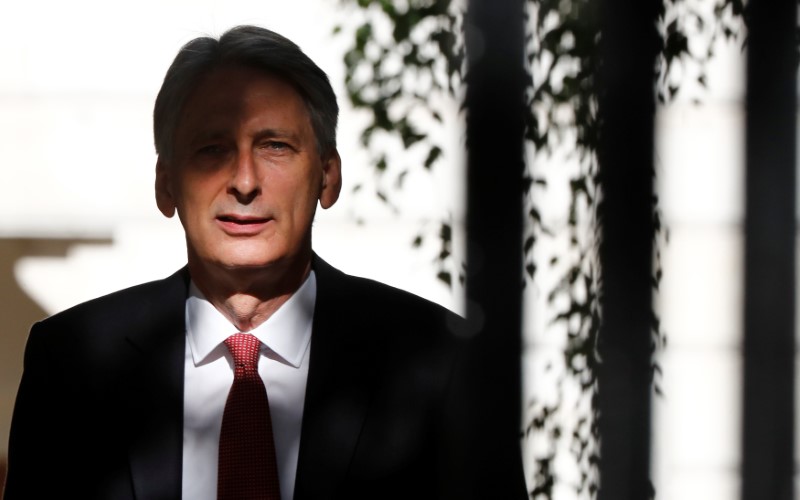Investing.com’s stocks of the week
By William Schomberg
LONDON (Reuters) - British finance minister Philip Hammond has the chance on Thursday to revive his calls for a more business-friendly exit from the EU in a debate blown wide open again by an election that has undermined Prime Minister Theresa May's authority.
Hammond will address an annual gathering of London's financial elite who, like many other business leaders, fear that May's insistence that "no deal is better than a bad deal" will cost them business in the European Union.
Britain's giant banking industry sees Hammond as its most powerful ally and bankers were worried when it appeared he might lose his job in the run-up to the election.
"It is in everyone's interests that UK financial services remain strong and competitive," City of London Lord Mayor Andrew Parmley is due to say at the Mansion House dinner where Hammond and Bank of England Governor Mark Carney will speak.
"This sector should help shape our negotiations with the EU," Parmley says, in speech excerpts released to media.
Until a few days ago, it had seemed likely that Hammond would not be giving the Mansion House speech. Newspapers said he had fallen out with May's powerful aides and speculation was rife about who might replace him.
But with May reeling from the loss of her Conservative Party's parliamentary majority last week, she reappointed Hammond to his job, and it was her aides who lost theirs.
"Hammond is in a much more powerful position than he used to be," said a bank executive who regularly meets government officials. "Hammond is a pragmatist, he is business-friendly, and the Treasury have done all the serious work on Brexit."
In contrast to May's uncompromising tone with a focus on controlling immigration, Hammond has stressed the importance of ensuring that British employers can continue to find the skilled workers they need from the EU.
On Friday, the day after the election, he tweeted: "Pleased to be re-appointed so we can now get on and negotiate a Brexit deal that supports British jobs, business and prosperity."
The Times newspaper has said Hammond wanted May to keep Britain in the EU's customs union, allowing tariff-free trade within the bloc but preventing trade deals with other countries.
The Sun newspaper said Hammond won the backing of interior minister Amber Rudd on the need to focus on the economy in Brexit. Two former Conservative prime ministers have also urged May to soften her approach.
AUSTERITY FATIGUE
Hammond may use his speech to signal how the government will respond to the weariness among many voters over the spending cuts needed to turn Britain's budget deficit into a surplus, something the government says will take until the mid-2020s.
Inflation is at its highest since 2013, at 2.9 percent, while growth in basic pay lags at 1.7 percent, tightening the squeeze on households. Figures due to released at 0830 GMT on Thursday are expected to show retail sales fell in May.
The opposition Labour Party fared better than expected in the election with its promises of measures such as the end to a 1-percent cap on public sector pay increases, and a higher minimum wage.
Labour has also said Britain needs to spend more to prevent the kind of attacks carried out recently by Islamist militants and it has linked a fire disaster in a London tower block this week to constraints on spending.
However, Hammond's options for a significant loosening of the purse strings appear limited, not only by his fiscally hawkish instincts and Britain's still weak public finances, but also by the Conservative Party's diminished clout.
"Although many in parliament would agree with some change in the fiscal stance, it could be hard to reach agreement on a fully comprehensive package of fiscal measures and in particular how to fund them," JP Morgan economist Allan Monks said.
In a nod to the concerns among some businesses about their funding options, the Treasury said it will step up the level of financial support it provides to firms ranging from start-ups to infrastructure providers.
Also on Thursday, the Bank of England is set to signal once again that, with the economy struggling to regain momentum, it is in no hurry to raise interest rates from their all-time low.
Its policymakers are likely to focus more on the spending power squeeze for many households than rising inflation, which they expect will prove a short-lived consequence of the fall in the pound after last year's Brexit vote.
Growth slowed sharply in early 2017 and the BoE may see the uncertainty caused by May's election flop as another reason to keep borrowing costs low, or even consider providing further stimulus to help growth if needed.
The BoE is due to publish its latest monetary policy statement at 1100 GMT.
